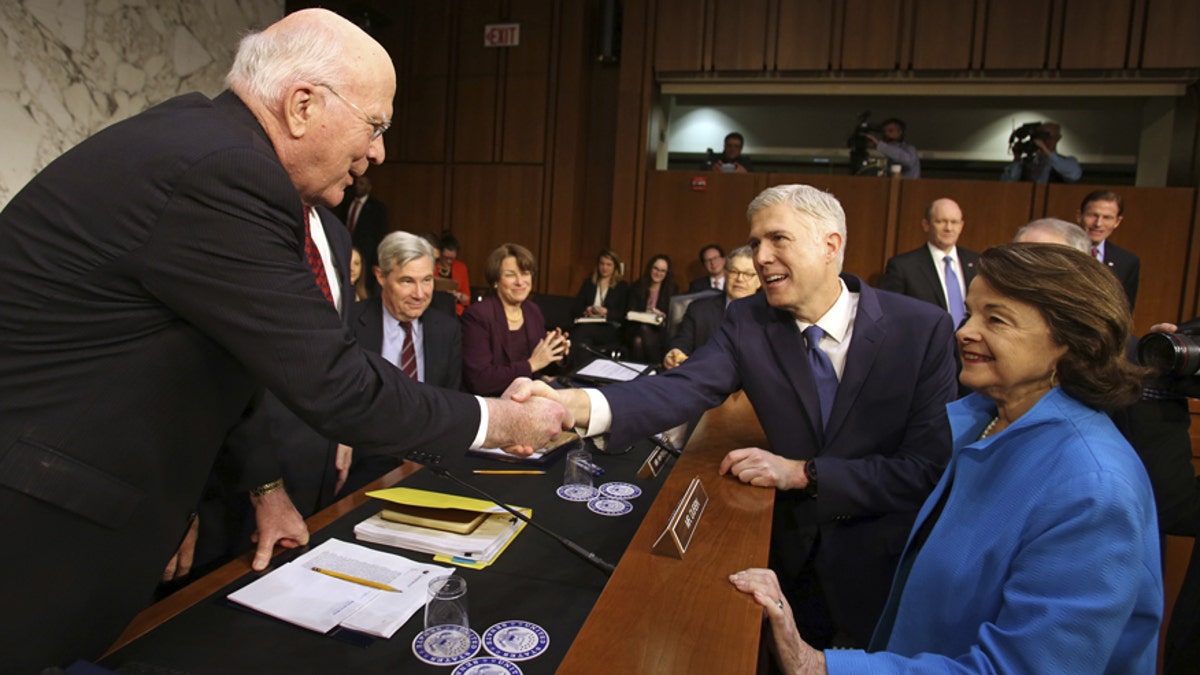
FILE -- Judge Neil Gorsuch meets with Sens. Leahy and Feinstein. (FNC)
More than two months ago, President Trump made it clear that if Neil Gorsuch’s nomination to the Supreme Court created gridlock, he would say “If you can, Mitch, go nuclear.”
Trump’s words came to fruition Thursday, as Senate Republicans triggered the “nuclear option,” abandoning the long-held tradition of requiring 60 votes for confirmation, clearing the path for Neil Gorsuch to succeed the late Antonin Scalia on the court.
At the time of Scalia’s passing last year, President Obama had of course nominated Merrick Garland to the court, but the Republican majority refused to even give Garland’s nomination a judicial committee hearing.
By both previously refusing Garland a hearing and eliminating the filibuster, many say the Republicans have turned the Senate from the hallmark of collegiality and bipartisanship into a denizen of factionalism, mirroring the divisions in seemingly every aspect of American political life.
Here are the five takeaways that I believe are most important from Gorsuch’s nomination process and the impact this particular nomination process will have on the future of the Senate:
1. Gorsuch is qualified for the position and deserved confirmation. In fact, I believe Judge Gorsuch should have been confirmed without the Republicans having to take the “nuclear option.”
2. We are in a highly polarized political environment. Many Democrats faulting Majority Leader Mitch McConnell seem to forget that just four years ago, Harry Reid eliminated the filibuster on lower judicial nominations as well. Yet, in the case of Gorsuch’s nomination, our political polarization extended beyond Congress and into the Supreme Court, with its decision-making power hanging in the balance. I regret that the filibuster was abandoned, but securing the Court’s functional integrity was most critical.
3. Democrats have put themselves in this position. Seemingly since Election Day, the fundamental Democratic Party strategy has been to resist Trump at every step. Regardless of whether or not Gorsuch truly is a philosophical or moral threat to traditional party values, the Democratic strategy dictated that they must resist his nomination in every possible way. Strategic objectives, not traditional values, created this outcome and now threaten to more rapidly polarize our political environment.
4. If the Democrats could not compromise with Republicans on a judge who was previously confirmed by unanimous vote in 2006 to the Court of Appeals for the Tenth Circuit, then opportunities for future bipartisanship will be limited, decreasing the likelihood of any and all legislative reforms on the horizon.
5. Furthermore, if partisanship continues to toxify the Senate, it may only a matter of time before a majority party moves to eliminate the filibuster on legislative matters as well. Such a move would destroy one of the few remaining vestiges of rigorous debate in American politics.
Yet, like the threat posed to the Supreme Court if a critical seat remained unfilled, politicians’ inability to deliver much-needed social and economic reforms to the American people may make removing the filibuster a political necessity for a majority party in the near future.
